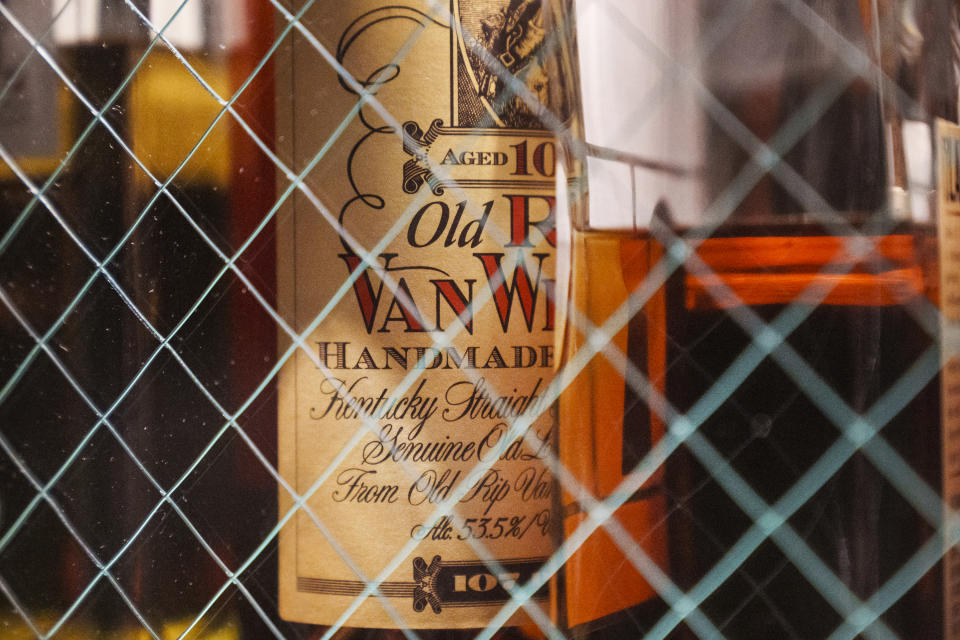No criminal charges in rare liquor probe at Oregon alcohol agency, state report says
PORTLAND, Ore. (AP) — Criminal charges are not warranted in the rare liquor probe that shook Oregon’s alcohol agency last year and forced its executive director to resign, state justice officials said Monday.
In February 2023, the Oregon Department of Justice began investigating whether employees of the Oregon Liquor and Cannabis Commission improperly used their positions to obtain bottles of top-shelf bourbon for personal use. The department reviewed thousands of documents and emails, and interviewed dozens of people, including current and former commission employees and liquor store agents. It concluded it did not have sufficient evidence to prove the criminal offenses it had considered — official misconduct and misuse of confidential information — beyond a reasonable doubt.
In a report released Monday, the department said that “even though the employees’ behavior may have breached ethical standards, there is no explicit policy prohibiting the specific conduct, we found no evidence of relevant training, and the practice appears to have been longstanding and endorsed by at least one executive director.”
The findings were announced in a news release from Oregon Attorney General Ellen Rosenblum, who described the investigation as thorough and said it was “critical that Oregonians have trust in our state agencies, their leaders and employees.”
Justice officials launched the probe last year after news outlets obtained via public records requests an internal investigation by the agency that concluded its then-Executive Director Steve Marks and five other agency officials had diverted sought-after bourbons, including Pappy Van Winkle's 23-year-old whiskey, for personal use.
Officials were paying for the whiskey, which can cost thousands of dollars a bottle, but they had used their knowledge and connections at the commission to obtain them, and consequently deprived members of the public of the expensive booze, the internal investigation said.
The officials purportedly had very limited bottles of top-shelf bourbon routed to a liquor store, often in the Portland suburb of Milwaukie where the commission headquarters is located, and would reserve them for pickup later. They said they used the whiskey for personal consumption or as gifts.
In his responses to questions from the internal investigator, Marks denied that he had violated Oregon ethics laws and state policy. However, he acknowledged that he had received preferential treatment “to some extent” in obtaining the whiskey as a commission employee. Marks and the other officials said they never resold the whiskeys they obtained.
In its probe, the commission considered that the funneling of top-end whiskey to leaders of the state agency violated Oregon statutes, including one that prohibits public officials from using confidential information for personal gain. The state justice department's subsequent investigation, however, found this offense wasn't warranted, “because the nonpublic information relied on by the employees — that a rare liquor bottle was available — did not affect the bottle itself” by increasing its value.
Justice officials said criminal charges of official misconduct weren't warranted either, as they would require proof that the employees knew their actions were unauthorized and there are no statutes that explicitly prohibit the conduct seen in the case.
Democratic Gov. Tina Kotek thanked the justice officials who worked on the investigation. She had called for the probe and requested Marks' resignation.
“While the investigation found that the conduct reviewed did not meet the burden necessary for criminal prosecution, the documents and reports resulting from the extensive criminal investigation will be available to the Oregon Government Ethics commission for consideration in its pending review of ethics complaints related to this matter," Kotek said in a statement.
The Oregon Government Ethics Commission, which is charged with enforcing government ethics laws, is conducting a separate, ongoing civil investigation into the matter.

 Yahoo News
Yahoo News 

